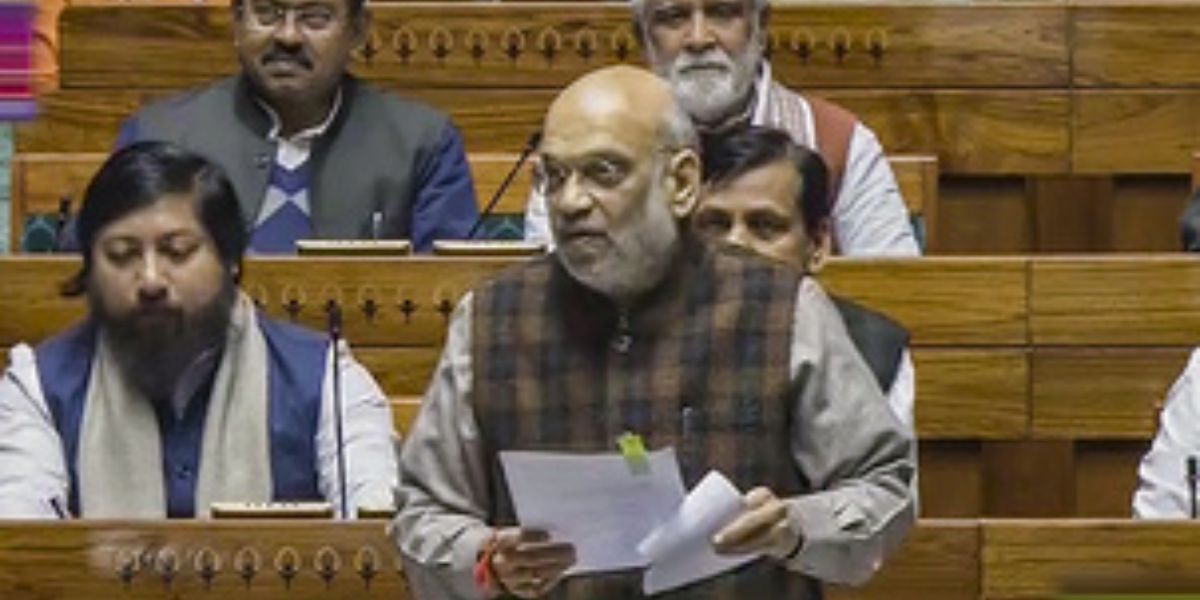The Citizenship (Amendment) Rules, 2024, as it is termed, will enable those eligible under CAA-2019 to apply for Indian citizenship.

Union Home Minister Amit Shah speaking in the Lok Sabha.
The rules for the controversial Citizenship Amendment Act (CAA) were notified on Monday, 11, March, just weeks ahead of the upcoming Lok Sabha elections.
The Citizenship (Amendment) Rules, 2024, as it is termed, will enable religious minorities from Bangladesh, Pakistan and Afghanistan under CAA-2019 to apply for Indian citizenship.
The CAA, an integral part of the BJP’s manifesto for the 2019 Lok Sabha elections, drew massive protests across the country, after it was passed by the Parliament in December 2019 and got the presidential assent.
The law could not be enacted so far as rules were yet to be notified for its implementation.
A significant change introduced by this new law is that it includes religion for the first time as an eligibility criteria for acquiring Indian citizenship, triggering fear among the religious minorities that it could be used to target them. Several opposition parties had termed the law divisive.
According to the Ministry of Home Affairs (MHA), a portal has been provided for submitting the applications. The entire process will be in online mode.
The rules pave the way for providing citizenship to undocumented religious minority migrants, predominantly non-Muslims, hailing from the neighbouring Muslim-majority countries Pakistan, Bangladesh, and Afghanistan.
This applies to Hindus, Sikhs, Jains, Buddhists, Parsis and Christians, who came to India on or before December 31, 2014, due to religious persecution in their home countries. The Act however, excludes Muslims.
The new law will benefit the refugees from these Muslim-majority countries, who don’t have documents or any other papers. The applicants need not submit any papers.
However, the applicants will have to declare the year they entered India.
Immigrants will be granted the Indian citizenship if they have lived in India for the past year and at least 11 years of the preceding 14 years. However, for the specified class of illegal migrants, the number of years of residency has been relaxed to five years.
If there are any ongoing legal actions against a person related to illegal migration or citizenship on and from the date of commencement of CAA 2019, those proceedings will be considered void starting from the date the person enters India.
Earlier, the requirement for migrants to acquire citizenship by naturalisation was 11 years.
To become a citizen through naturalization, a person needs to fill out a form, which includes an affidavit confirming the truth of the information in the application, along with another affidavit from an Indian citizen vouching for the applicant’s character.
A declaration from the applicant stating that they have sufficient knowledge of one of the languages listed.
According to the 1955 Act, individuals of Indian origin or the spouses of individuals of Indian origin can register as Overseas Citizens of India (OCI). This registration grants them benefits, including the right to travel, work, and study in India.
Amendments to the law now allow the cancellation of OCI registration if the person has violated any laws specified by the central government.
A person granted a certificate of registration or certificate of naturalisation will be considered a citizen of India starting from the date he or she entered the country.
The new law excludes the tribal areas of Assam, Meghalaya, Mizoram, and Tripura, including specific areas like Karbi Anglong in Assam, Garo Hills in Meghalaya, Chakma district in Mizoram, and Tribal areas district in Tripura.
The states regulated by the Inner Line permit under the Bengal Eastern Frontier Regulations 1873 are also exceptions.
Once the application is submitted, an electronic acknowledgment will be generated.
The Designated Officer, will then check the documents submitted by the applicant along with the application.
The officer will also guide the applicant through the oath of allegiance, specified in the Second Schedule to the Citizenship Act of 1955.
The officer will then sign the oath and send it electronically, along with confirmation of document verification, to the Empowered Committee.
If an applicant doesn’t show up to subscribe to the application and take the oath despite being given reasonable opportunities, the District Level Committee will send the application to the Empowered Committee for possible refusal.
Union Home Minister Amit Shah had said last month that the CAA rules will be implemented before the Lok Sabha polls.
“Our Muslim brothers are being misled and instigated (against the CAA). The CAA is only meant to give citizenship to those who came to India after facing persecution in Pakistan, Afghanistan and Bangladesh. It is not for snatching anyone’s Indian citizenship,” he had said.
(Compiled and edited by Shauqueen Mizaj)

May 08, 2024

May 07, 2024

May 02, 2024

Apr 29, 2024

Apr 28, 2024

Apr 27, 2024